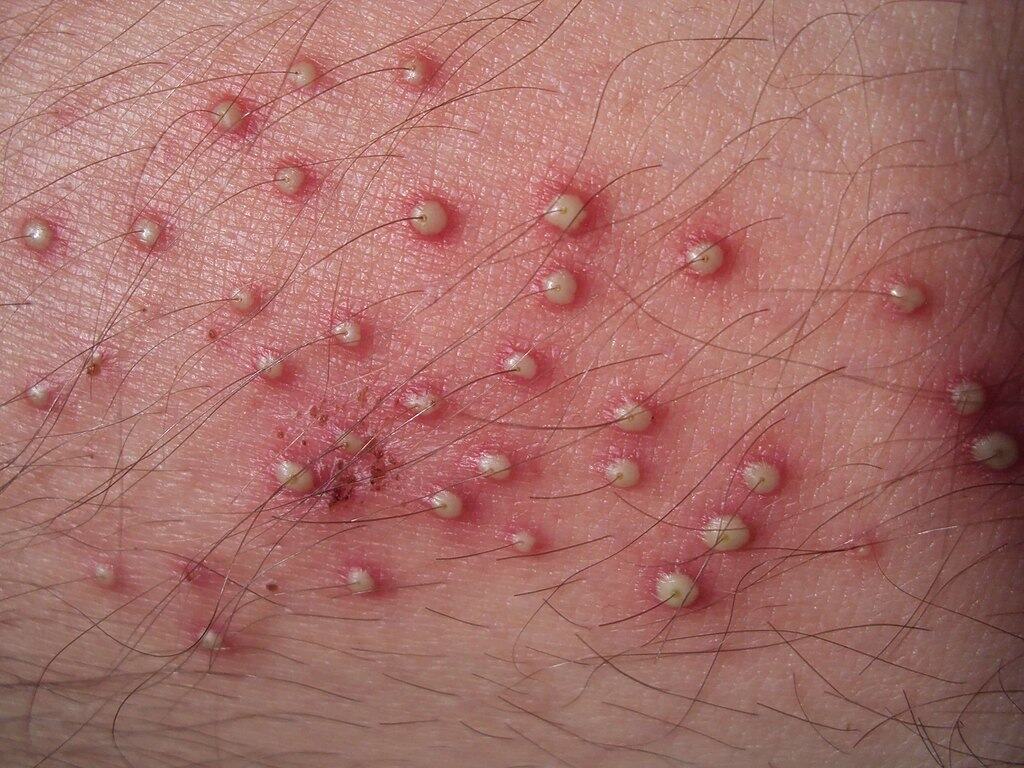
Understanding Folliculitis
Types of Folliculitis
Different types of folliculitis require different treatments. The most common include:
Bacterial Folliculitis – Caused by Staphylococcus aureus bacteria, leading to red, itchy bumps or pustules around hair follicles.
Fungal Folliculitis – Triggered by yeast or fungi, usually appearing as persistent, itchy, acne-like eruptions on the chest, back, or shoulders.
Pseudofolliculitis Barbae (Razor Bumps) – Common in men who shave frequently; occurs when hair curls back into the skin, causing irritation and inflammation.
Hot Tub Folliculitis – Caused by Pseudomonas aeruginosa bacteria found in poorly chlorinated pools or hot tubs.
Scalp Folliculitis – A chronic and often recurring condition causing painful pustules, itching, and hair thinning.
Understanding the type of folliculitis is crucial in formulating an effective and personalized treatment plan.
Causes and Risk Factors
Folliculitis can occur due to several internal and external factors. Common triggers include:
Poor hygiene or excessive sweating
Tight clothing or friction from shaving
Blocked pores from oils, creams, or sweat
Overuse of antibiotics or steroid creams
Compromised immune system
Existing skin conditions like acne or dermatitis
Our dermatologists perform a detailed skin analysis to identify the root cause before beginning treatment. This ensures that the therapy not only clears the current infection but also prevents future recurrences.
Symptoms to Watch For
The signs of folliculitis can vary depending on its type and severity. Look out for:
Red, inflamed bumps or white-headed pimples
Itching or burning sensation on the skin
Tenderness or pain around affected areas
Pus or fluid-filled lesions
Crusting or scabbing of the skin
Hair loss or scarring in chronic cases
Early diagnosis and professional treatment can help avoid complications and permanent damage to the skin and hair follicles.
Advanced Diagnosis
Our clinic uses state-of-the-art diagnostic tools to determine the underlying cause of folliculitis. The process may include:
Dermatoscopic Examination – To closely examine the follicular openings and surrounding skin.
Skin Swab or Culture Test – To identify bacterial or fungal infections.
Trichoscopy (Scalp Analysis) – For scalp-related folliculitis and associated hair loss.
Allergy and Sensitivity Tests – To detect triggers such as cosmetic or product-related irritation.
By combining these tests with your medical history and lifestyle assessment, our dermatologists can provide a clear diagnosis and treatment roadmap.
Treatment Options for Folliculitis
Our clinic offers comprehensive and minimally invasive treatments to address folliculitis effectively. Treatment is tailored to each patient’s skin type, infection severity, and lifestyle.
1. Topical and Oral Medications
Depending on the type of infection, antibacterial, antifungal, or anti-inflammatory medications may be prescribed to reduce inflammation and eliminate infection.
2. Laser Hair Reduction
For recurring folliculitis, especially in areas caused by shaving or waxing, laser hair reduction offers a long-term solution by reducing hair growth and preventing ingrown hairs.
3. Chemical Peels and Medicated Washes
Mild peels and cleansers with salicylic acid, glycolic acid, or benzoyl peroxide help unclog pores, reduce bacterial load, and prevent new eruptions.
4. Phototherapy (Light-Based Treatments)
Low-level light therapy can soothe inflammation, destroy bacteria, and promote faster healing without damaging surrounding skin.
5. Lifestyle and Skincare Guidance
Our dermatologists provide tailored skincare advice, including product recommendations, hygiene practices, and post-treatment care to prevent recurrence.
Each treatment plan is designed to not only clear the infection but also restore skin health, improve texture, and enhance confidence.
Why Choose Our Clinic for Folliculitis Treatment
Experienced Dermatologists: Our team consists of certified dermatologists with expertise in managing complex and recurring folliculitis cases.
Customized Solutions: Each patient receives a personalized treatment plan after thorough assessment and diagnostic evaluation.
Advanced Technology: We use modern tools and laser systems approved for Indian skin types to ensure safety and effectiveness.
Focus on Root Cause: Our approach goes beyond symptom relief—we aim to treat underlying triggers for long-term improvement.
Comprehensive Aftercare: We provide detailed post-treatment care instructions and follow-up consultations to ensure optimal recovery.
Preventing Recurrence of Folliculitis
Simple preventive measures can significantly reduce the risk of recurrence:
Maintain proper hygiene and keep the skin dry.
Avoid tight or non-breathable clothing.
Shave in the direction of hair growth using a clean razor.
Use non-comedogenic skincare and hair products.
Avoid sharing towels or personal grooming tools.
Follow regular dermatologist check-ups if you have a history of recurrent folliculitis.
Our dermatology experts guide you through these preventive strategies to help maintain clear and healthy skin.
